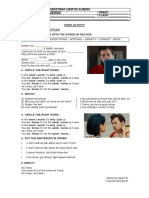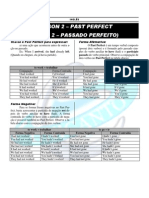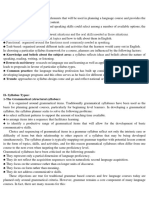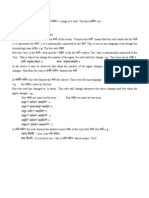Grammar: Auxiliary Verbs, Modal Auxiliaries) Are
Grammar: Auxiliary Verbs, Modal Auxiliaries) Are
Uploaded by
Vaishu UparkarCopyright:
Available Formats
Grammar: Auxiliary Verbs, Modal Auxiliaries) Are
Grammar: Auxiliary Verbs, Modal Auxiliaries) Are
Uploaded by
Vaishu UparkarOriginal Title
Copyright
Available Formats
Share this document
Did you find this document useful?
Is this content inappropriate?
Copyright:
Available Formats
Grammar: Auxiliary Verbs, Modal Auxiliaries) Are
Grammar: Auxiliary Verbs, Modal Auxiliaries) Are
Uploaded by
Vaishu UparkarCopyright:
Available Formats
GRAMMAR
Modal verbs and their meaning
What are modal verbs?
Modals (also called modal verbs, modal
auxiliary verbs, modal auxiliaries) are
special verbs which behave irregularly in
English. They are different from normal
verbs like "work, play, visit..." They give
additional information about
the function of the main verb that follows
it. They have a great variety
of communicative functions.
Here are some characteristics of modal
verbs:
They never change their form. You can't
add "s", "ed", "ing"...
They are always followed by an infinitive
without "to" (e.i. the bare infinitive.)
They are used to indicate modality allow
speakers to express certainty, possibility, willingness, obligation, necessity, ability
List of modal verbs
Here is a list of modal verbs:
can, could, may, might, will, would, shall, should,
must
The verbs or expressions dare, ought to, had better, and need not behave
like modal auxiliaries to a large extent and my be added to the above list
Use of modal verbs:
Modal verbs are used to express functions such as:
1. Permission
2. Ability
3. Obligation
4. Prohibition
5. Lack of necessity
6. Advice
7. possibility
8. probability
Examples of modal verbs
Here is a list of modals with examples:
Modal Verb Expressing Example
Strong obligation You must stop when the traffic lights turn
red.
must
logical conclusion / Certainty He must be very tired. He's been working
all day long.
must not prohibition You must not smoke in the hospital.
ability I can swim.
can permission Can I use your phone please?
possibility Smoking can cause cancer.
ability in the past When I was younger I could run fast.
could polite permission Excuse me, could I just say something?
possibility It could rain tomorrow!
permission May I use your phone please?
may
possibility, probability It may rain tomorrow!
polite permission Might I suggest an idea?
might
possibility, probability I might go on holiday to Australia next
year.
lack of necessity/absence of I need not buy tomatoes. There are plenty
need not
obligation of tomatoes in the fridge.
50 % obligation I should / ought to see a doctor. I have a
terrible headache.
should/ought
advice You should / ought to revise your lessons
to
logical conclusion He should / ought to be very tired. He's
been working all day long.
had better advice You 'd better revise your lessons
Remember
Modal verbs are followed by an infinitive without "to", also called the bare
infinitive.
Examples:
You must stop when the traffic lights turn red.
You should see to the doctor.
There are a lot of tomatoes in the fridge. You need not buy any.
Modal verbs
The modal verbs include can, must, may, might, will, would, should. They
are used with other verbs to express ability, obligation, possibility, and so
on. Below is a list showing the most useful modals and their most
common meanings:
Modal Meaning Example
can to express ability I can speak a little Russian.
can to request permission Can I open the window?
may to express possibility I may be home late.
may to request permission May I sit down, please?
must to express obligation I must go now.
must to express strong belief She must be over 90 years old.
should to give advice You should stop smoking.
would to request or offer Would you like a cup of tea?
would in if-sentences If I were you, I would say sorry.
Modal verbs are unlike other verbs. They do not change their form
(spelling) and they have no infinitive or participle (past/present). The
modals must and can need substitute verbs to express obligation or
ability in the different tenses. Here are some examples:
Past simple Sorry I'm late. I had to finish my math test.
Present perfect She's had to return to Korea at short notice.
Future You'll have to work hard if you want to pass the exams.
Infinitive I don't want to have to go.
Past simple I couldn't/wasn't able to walk until I was 3 years old.
Present perfect I haven't been able to solve this problem. Can you help?
Future I'm not sure if I will be able to come to your party.
Infinitive I would love to be able to play the piano.
Modals are auxiliary verbs. They do not need an additional
auxiliary in negatives or questions. For example: Must I come? (Do I must
come?), or: He shouldn't smoke (He doesn't should smoke).
You might also like
- Passive voice Идэвхгүй хэв: Erdemtugs schoolDocument16 pagesPassive voice Идэвхгүй хэв: Erdemtugs schoolBrave Arrazando100% (1)
- Simple Past ProvaDocument3 pagesSimple Past ProvaLaís MilhomemNo ratings yet
- Question TagDocument9 pagesQuestion TagfleuriNo ratings yet
- Atividade 7 Inglês 7°anoDocument3 pagesAtividade 7 Inglês 7°anoPedro RielaNo ratings yet
- Modal Verbs ActivityDocument1 pageModal Verbs ActivitySandra Patrícia Miranda da SilvaNo ratings yet
- Future Will: English LessonDocument11 pagesFuture Will: English LessonNick OrtegaNo ratings yet
- 1.the Comparative of AdjectivesDocument2 pages1.the Comparative of AdjectivesSylvia Rodríguez100% (1)
- Fonte: MOORE, Sophia. A New Way of English - Inglês Ensino Médio. 1 Edição, 2007Document3 pagesFonte: MOORE, Sophia. A New Way of English - Inglês Ensino Médio. 1 Edição, 2007Ana Elis AlmeidaNo ratings yet
- Text Comprehension ExercisesDocument11 pagesText Comprehension ExercisesBonsai Treinamentos E ConsultoriaNo ratings yet
- English Worksheet Song: Should I Stay or Should I Go? 1. Fill in The GapsDocument1 pageEnglish Worksheet Song: Should I Stay or Should I Go? 1. Fill in The GapsJose Freitas100% (1)
- Atividade de Ingles Halloween 03-11-2021Document3 pagesAtividade de Ingles Halloween 03-11-2021Júlia Borges Carvalho100% (1)
- Atividade 2 - Verb To Be Past and There To BeDocument3 pagesAtividade 2 - Verb To Be Past and There To BeFrancis SantosNo ratings yet
- Prova Ingles 1 UfcgDocument3 pagesProva Ingles 1 UfcgNagib Maciel100% (1)
- Atividade Avaliativa Extra Ingles 3 AnoDocument3 pagesAtividade Avaliativa Extra Ingles 3 Anokeissy.peres100% (1)
- Música + Pronome InterrogativoDocument3 pagesMúsica + Pronome InterrogativoHevelen GuimarãesNo ratings yet
- ATIVIDADE DE SALA DE AULA DE INGLES 9 ANO OkDocument3 pagesATIVIDADE DE SALA DE AULA DE INGLES 9 ANO OkMário André De Oliveira CruzNo ratings yet
- 609 Reading Comprehension Passage 39 MCQ Test With Answers The State and The ArtsDocument3 pages609 Reading Comprehension Passage 39 MCQ Test With Answers The State and The ArtsDalga ÖzalNo ratings yet
- 1 Ano - Atividade Present ContinuousDocument2 pages1 Ano - Atividade Present ContinuousPatriciaLimaNo ratings yet
- ENEM 2º Ano SimuladoDocument3 pagesENEM 2º Ano SimuladoSandra BotelhoNo ratings yet
- Present Perfect and Simple PastDocument2 pagesPresent Perfect and Simple PastMichelle LeonyNo ratings yet
- Quiz On Modal VerbsDocument9 pagesQuiz On Modal VerbsRaheel Abbas100% (1)
- Listening Bruno MarsDocument3 pagesListening Bruno MarsDamaris RetamalNo ratings yet
- Exercícios Passive VoiceDocument11 pagesExercícios Passive VoiceVagner ReisNo ratings yet
- 2° Simulado 2011 - CmlemDocument4 pages2° Simulado 2011 - CmlemjuscileiapradoNo ratings yet
- Active and Passive VoiceDocument2 pagesActive and Passive VoiceErliza LeosalaNo ratings yet
- Pronoun and Its TypesDocument9 pagesPronoun and Its TypesRosita BagusNo ratings yet
- Third ConditionalDocument3 pagesThird ConditionalPhilipe de Medeiros FrancoNo ratings yet
- Elenilde de Jesus Andrade - 19-07 ATIVIDADE Sobre Música Do ALOKDocument1 pageElenilde de Jesus Andrade - 19-07 ATIVIDADE Sobre Música Do ALOKAline Irisnã AlmeidaNo ratings yet
- Verbos Modais: Colégio Pedro II - Campus São Cristóvão II 9º Ano - Prof. Flávia/Cristiane/Bruno InglêsDocument4 pagesVerbos Modais: Colégio Pedro II - Campus São Cristóvão II 9º Ano - Prof. Flávia/Cristiane/Bruno InglêsElisangela Santiago Dos Santos100% (1)
- Simulado de InglesDocument3 pagesSimulado de InglesJane Cristina da SilvaNo ratings yet
- Simple PresentDocument6 pagesSimple PresentizaqueNo ratings yet
- Name: - DateDocument3 pagesName: - DateKelly Johana Díaz100% (1)
- Questoes para SimuladoDocument4 pagesQuestoes para SimuladoThyara AndradeNo ratings yet
- There To Be 2Document1 pageThere To Be 2Luis RitaNo ratings yet
- Apostila 7 - Usos Do Verbo To Be No PassadoDocument12 pagesApostila 7 - Usos Do Verbo To Be No PassadoBeatrizBorgesNo ratings yet
- Conditional Sentences Zero and FirstDocument23 pagesConditional Sentences Zero and FirstRhamon SilvaNo ratings yet
- English Modal VerbsDocument10 pagesEnglish Modal VerbsMaría Auxiliadora Jácome OrtegaNo ratings yet
- Exercicios Avaliatios Simple PresentDocument2 pagesExercicios Avaliatios Simple PresentKedma KirllyNo ratings yet
- SONG WORKSHEET - AS IT WAS by HARRY STYLESDocument1 pageSONG WORKSHEET - AS IT WAS by HARRY STYLEScheleasouza31gmail.com bia2919100% (1)
- Indefinite PronounsDocument6 pagesIndefinite PronounsEndlesly Amor DionisioNo ratings yet
- Exercicio de InglesDocument3 pagesExercicio de InglesgilmafreireNo ratings yet
- The Verb Phrase: Be, Have, Do Can, Could, May, Might, Will, Shall, Would, Should, MustDocument3 pagesThe Verb Phrase: Be, Have, Do Can, Could, May, Might, Will, Shall, Would, Should, MustPetra BajacNo ratings yet
- Ordinal Numbers and DatesDocument8 pagesOrdinal Numbers and DatesCarli MattioliNo ratings yet
- 02 Lesson 2Document3 pages02 Lesson 2Eli JúniorNo ratings yet
- Forma Sem Contração Forma Contraída: I I' You You' He He' She She' It It' We We' You You' They They'Document2 pagesForma Sem Contração Forma Contraída: I I' You You' He He' She She' It It' We We' You You' They They'Lenine Reinaldo100% (1)
- English Model Question For Class Eight PDFDocument3 pagesEnglish Model Question For Class Eight PDFMuntasir MamunNo ratings yet
- Revisao Prova Simple PresentDocument1 pageRevisao Prova Simple PresentdaniloebiancaNo ratings yet
- Modal VerbsDocument4 pagesModal VerbsabrantesdeborakellyNo ratings yet
- 1o Ano Favelas The Present Continuous TenseDocument6 pages1o Ano Favelas The Present Continuous Tenseretavares34100% (1)
- Apostila Past Continuous 8°Document2 pagesApostila Past Continuous 8°Antonio Cipriano50% (2)
- 2024 Online 02 Inglês Enem Vest ExercíciosDocument5 pages2024 Online 02 Inglês Enem Vest ExercíciosGraziele - AC - GabineteNo ratings yet
- Syllabus TypesDocument6 pagesSyllabus TypesMerbai MajdaNo ratings yet
- Nominal Groups Verbs Sentences: Ready-To-Print Grammar SheetsDocument20 pagesNominal Groups Verbs Sentences: Ready-To-Print Grammar SheetsAnonymous xMYE0TiNBcNo ratings yet
- Eg. Do You Drink Lemonade?Document1 pageEg. Do You Drink Lemonade?Richard HermanNo ratings yet
- Questões EPCAR - Simulado 1Document5 pagesQuestões EPCAR - Simulado 1meusgatos2024No ratings yet
- Exercícios Sobre The Past TenseDocument5 pagesExercícios Sobre The Past TenseAugusto CarvalhoNo ratings yet
- Lesson 4 - AdverbsDocument2 pagesLesson 4 - AdverbsAkbarul AminNo ratings yet
- Prefix and Suffix ExercisesDocument5 pagesPrefix and Suffix ExercisesSebastian CamiloNo ratings yet
- Verbs, Modal Auxiliaries) Are Special Verbs WhichDocument2 pagesVerbs, Modal Auxiliaries) Are Special Verbs WhichKniliasNo ratings yet
- Modal VerbsDocument3 pagesModal Verbsmessrassem12No ratings yet
- Auxiliary Verbs, Modal Auxiliaries) AreDocument3 pagesAuxiliary Verbs, Modal Auxiliaries) AreAijamal SartaevaNo ratings yet
- Study Material 12 PhysicsDocument117 pagesStudy Material 12 PhysicsVaishu Uparkar100% (1)
- Father To SonDocument17 pagesFather To SonVaishu UparkarNo ratings yet
- Dust of Snow MCQDocument4 pagesDust of Snow MCQVaishu UparkarNo ratings yet
- Determiners CompleteDocument44 pagesDeterminers CompleteVaishu UparkarNo ratings yet
- Short Answer Question-3Document1 pageShort Answer Question-3Vaishu UparkarNo ratings yet
- A Photograph NotesDocument4 pagesA Photograph NotesVaishu Uparkar100% (1)
- Class 9 English Moments Word Meaning: Chapter 4 in The Kingdom of FoolsDocument1 pageClass 9 English Moments Word Meaning: Chapter 4 in The Kingdom of FoolsVaishu Uparkar0% (3)
- Class X - CH - 10 The Sermon at BenarasDocument19 pagesClass X - CH - 10 The Sermon at BenarasVaishu UparkarNo ratings yet
- Ailing Planet MCQDocument7 pagesAiling Planet MCQVaishu UparkarNo ratings yet
- Long Answer Type QuestionsDocument2 pagesLong Answer Type QuestionsVaishu UparkarNo ratings yet
- A Tiger in The ZooDocument10 pagesA Tiger in The ZooVaishu Uparkar100% (3)
- Dust of Snow MCQ AnswerDocument2 pagesDust of Snow MCQ AnswerVaishu UparkarNo ratings yet
- The Little Girl - Voc&MCQ - VaishDocument8 pagesThe Little Girl - Voc&MCQ - VaishVaishu UparkarNo ratings yet
- Amanda About The Poet Robin MC Maugh Klein Is and Australian Author of Books For Children. She Writes Children'sDocument11 pagesAmanda About The Poet Robin MC Maugh Klein Is and Australian Author of Books For Children. She Writes Children'sVaishu UparkarNo ratings yet
- Animals About The Poet-: Word MeaningsDocument8 pagesAnimals About The Poet-: Word MeaningsVaishu UparkarNo ratings yet
- English Core (301) General Instructions: Set-2, Code No.-1/2 2018Document12 pagesEnglish Core (301) General Instructions: Set-2, Code No.-1/2 2018Vaishu UparkarNo ratings yet
- A Letter To GodDocument10 pagesA Letter To GodVaishu Uparkar100% (2)
- 12 English Study Material Prose Chapter 6Document3 pages12 English Study Material Prose Chapter 6Vaishu UparkarNo ratings yet
- Buds Public School, Dubai: English Worksheet Grade 12 The Rat TrapDocument1 pageBuds Public School, Dubai: English Worksheet Grade 12 The Rat TrapVaishu UparkarNo ratings yet
- The RattrapDocument1 pageThe RattrapVaishu UparkarNo ratings yet
- The Boy King: Sese 4 ClassDocument14 pagesThe Boy King: Sese 4 ClassVaishu UparkarNo ratings yet
- French Grammar Tenses For English SpeakersDocument13 pagesFrench Grammar Tenses For English Speakersbiffin100% (2)
- Daftar Lengkap Regular Verb (Kata Kerja Beraturan) Beserta ArtinyaDocument46 pagesDaftar Lengkap Regular Verb (Kata Kerja Beraturan) Beserta ArtinyaNi’ma Laili Rohmatika100% (1)
- Irregular VerbsDocument3 pagesIrregular VerbsSaritaNo ratings yet
- Active and Passive Voice of The VerbDocument21 pagesActive and Passive Voice of The VerbBEALYN OLANNo ratings yet
- Irregular VerbsDocument3 pagesIrregular VerbsAngel Gabriel100% (1)
- Irregular Verbs With TranslationDocument3 pagesIrregular Verbs With TranslationManuela SeiblitzNo ratings yet
- Guía 7 y 8. Inglés. Noveno (Mayo)Document13 pagesGuía 7 y 8. Inglés. Noveno (Mayo)Eneida Càrdenas CogolloNo ratings yet
- Causative VerbsDocument15 pagesCausative VerbsNatalia Eki MulyaniNo ratings yet
- Instituto Médio Politécnico Globo-Nzeru MbawiriDocument7 pagesInstituto Médio Politécnico Globo-Nzeru MbawiriJoão Paulo XadrequeNo ratings yet
- Suvremeni EngleskiDocument25 pagesSuvremeni EngleskiDora LukacevicNo ratings yet
- Class 13 Modal PassiveDocument4 pagesClass 13 Modal PassiveMujib Sadeque ChowdhuryNo ratings yet
- Active and Passive Voice PresentationDocument9 pagesActive and Passive Voice PresentationfauhanyNo ratings yet
- DictionaryDocument77 pagesDictionaryGüven YurtsevenNo ratings yet
- Activity Introduce Yourself.: Where Are You From?Document56 pagesActivity Introduce Yourself.: Where Are You From?Jenifer CunvilloNo ratings yet
- Topic Active Voice and Passive Voice: - Presented by - Mehtab Ahmad & Fiza KhanDocument18 pagesTopic Active Voice and Passive Voice: - Presented by - Mehtab Ahmad & Fiza KhanMehtab Ahmad KhanNo ratings yet
- 05 Kartari KarmaNi BhaveDocument1 page05 Kartari KarmaNi Bhaveapi-2710470879% (14)
- Japanese Verbs Transitive IntransitiveDocument8 pagesJapanese Verbs Transitive Intransitivepaulo cassar100% (1)
- Verbos Irregulares en InglésDocument5 pagesVerbos Irregulares en InglésQuimico_EscepticoNo ratings yet
- Body Parts and ReflexivesDocument22 pagesBody Parts and Reflexivesapi-293988969No ratings yet
- Gerund N InfinitiveDocument10 pagesGerund N InfinitiveNovia Indah NeswaraNo ratings yet
- Verbs Which Cannot Be Used in The Passive VoiceDocument3 pagesVerbs Which Cannot Be Used in The Passive VoiceDamaris Neny KurniawatiNo ratings yet
- Irregular Verbs ListDocument5 pagesIrregular Verbs ListMaría Camila López JaramilloNo ratings yet
- PAT KLS 6 Semester 2 2021Document9 pagesPAT KLS 6 Semester 2 2021NurinaNo ratings yet
- Voice Change (Active To Passive)Document10 pagesVoice Change (Active To Passive)Limon HassanNo ratings yet
- Sách Anh VanDocument122 pagesSách Anh VanMinh Chanh NguyenNo ratings yet
- Verb List IrregularDocument12 pagesVerb List IrregularPerla duarteNo ratings yet
- Some Special Uses of The Passive VoiceDocument17 pagesSome Special Uses of The Passive VoiceCandelaria LuqueNo ratings yet
- English Digest (Part 02)Document72 pagesEnglish Digest (Part 02)MAHINUR ALAM MAHIMNo ratings yet













































































































